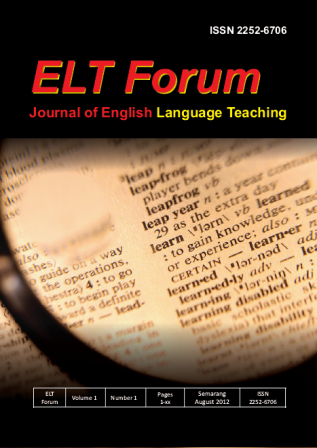THE IDEATIONAL MEANING IN THE U.S. PRESIDENTIAL DEBATE BETWEEN BARACK OBAMA AND MITT ROMNEY CONCERNING CHINA’S THREAT
Abstract
This article deals with ideational meaning realized in transcript of the U.S. presidential debate between Barack Obama and Mitt Romney concerning China’s threat. Ideational meaning talks about subject matter. It relates to information about objects or to what the utterances are about. In realizing the subject matter of the debate transcript, three analyses are conducted; Transitivity, speech function, and also analysis on context of situation. The result based on those analyses shows two points of conclusion. Firstly, Obama through Material and Relational Processes stated his past actions and recent U.S. condition to show his success and through Mental Process he certainly stated his hopes for the future. Meanwhile, Romney through Material and Relational Processes certainly stated the unfortunate condition experienced by the U.S. as a result of Obama’s policies and through Mental Process stated his wish to the U.S economy. Both speakers invited the audiences to accept the information concerning those solutions. Secondly, context of situation influences the debate transcript in its language use. Some terminologies in the area of economy and trade emerge as the influence of Field. Those terminologies make the conversation focuses on the subject matter being analyzed, that is China as a threat to the U.S.
References
Branham, J.R. 1991. Debate and Critical Analysis: The Harmony of Conflict. Retrieved from http://debate.uvm.edu/dcpdf/Branham_debate&criticalanalysis.pdf on February 12, 2013.
Butt, David. et al. 1996. Using Functional Grammar: An Explorers Guide. Sydney: Macquarie University
Denzin, N.K and Yvonna S. Lincoln. 1994. Introduction: Entering the Field of Qualitative Research. California: SAGE Publications, Inc.
Derewianka, Beverly. 2011. A New Grammar Companion. Sydney: Primary English Teaching Association
Eggins, Suzzane. 1994. An Introduction to Systemic Functional Linguistics. London: Pinter Publishers
Gerot, L. and P. Wignell. 1994. Making Sense of Functional Grammar. Sydney: Gerd Stabler
Halliday, M.A.K. and Christian M.I.M Matthiessen (ed). 2004. An Introduction to Functional Grammar (3rd ed). London: Oxford University Press Inc.
Halliday, M.A.K. and Ruqaiya Hasan. 1985. Language, Context, and Text: Aspects of Language in a Social-semiotic Perspective. Melbourne: Deakin University Press
Hammond, Jenny. et al. 1992. English for Social Purposes. Sydney: Macquarie University
Parla. Kristen. 2010. Democratic versus Republican Perspectives. Retrieved from http://usa5.org/d/democratic-versus-republican-perspectives-by-kristen-parla-e3777 on February 20, 2013.
Ramelan. 1999. English Phonetics. Semarang: IKIP Semarang Press
Wattles, Isidora and B. Radic-Bojanic. 2007. The Analysis of an Online Debate. FACTA UNIVERSITATIS Series: Linguistics and Literature. Vol. 5, pp. 47-58. Retrieved from http://facta.junis.ni.ac.rs/lal/lal2007/lal2007-05.pdf on February 19, 2013



_.jpg)
_.jpg)




